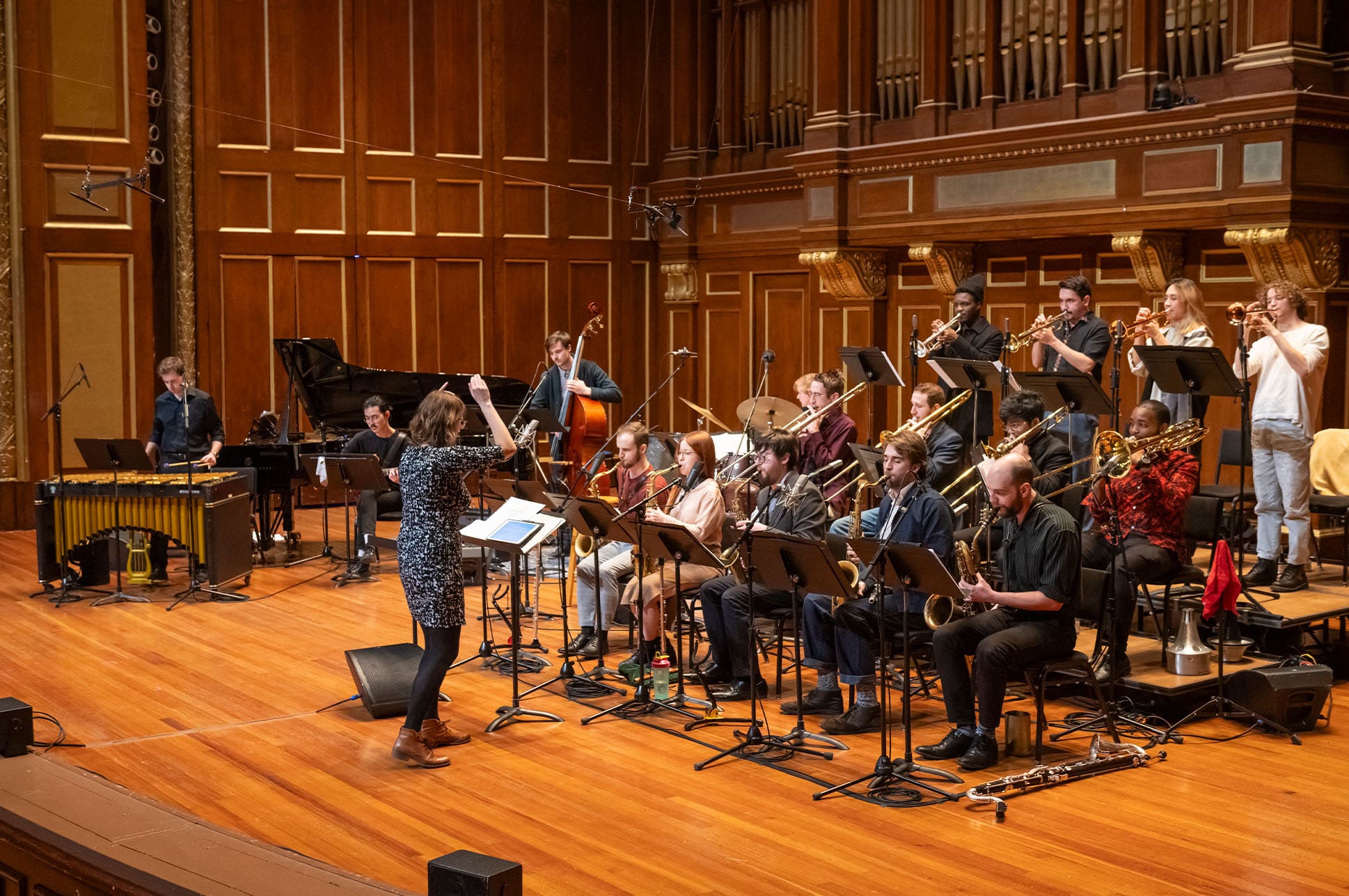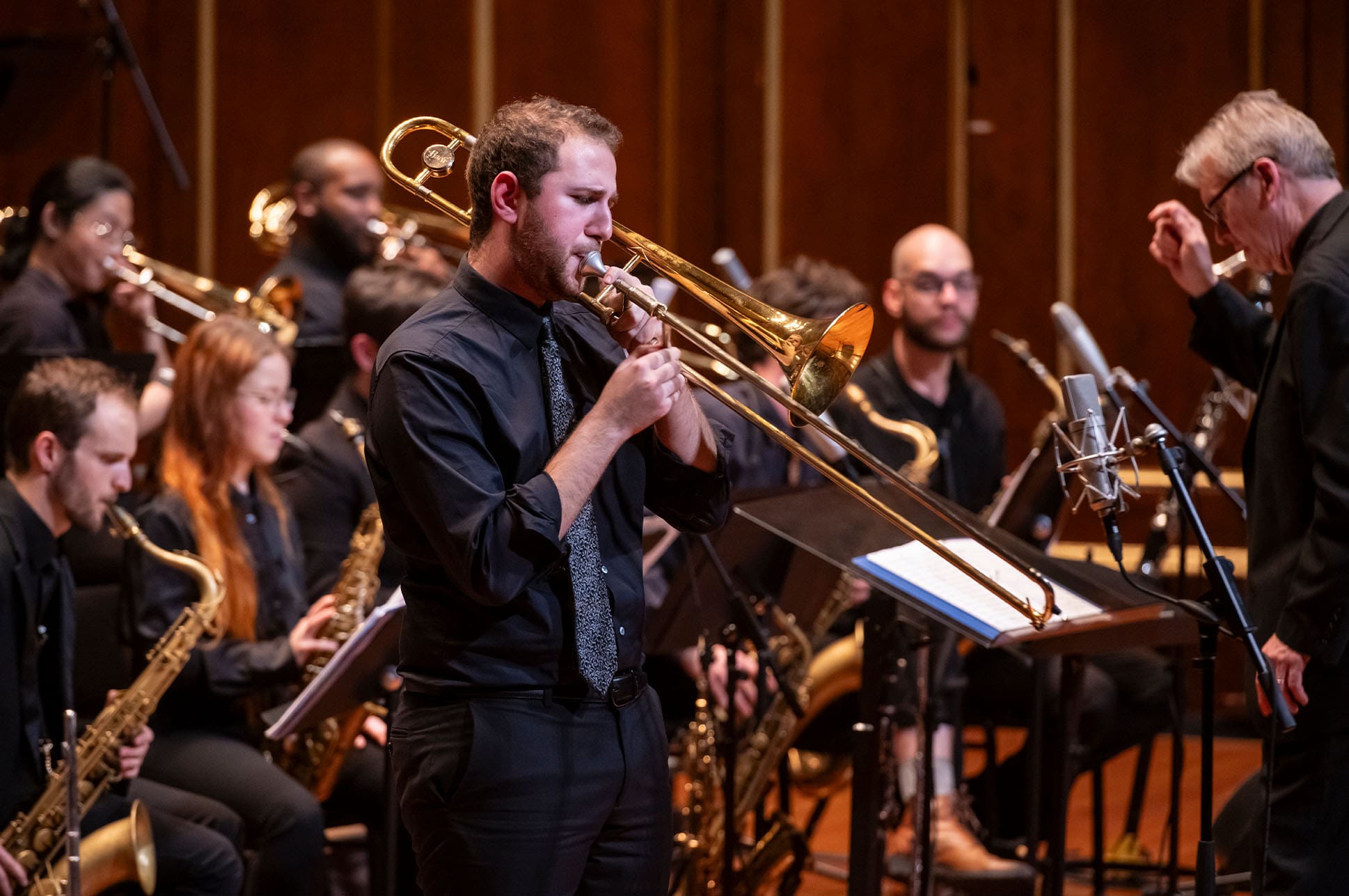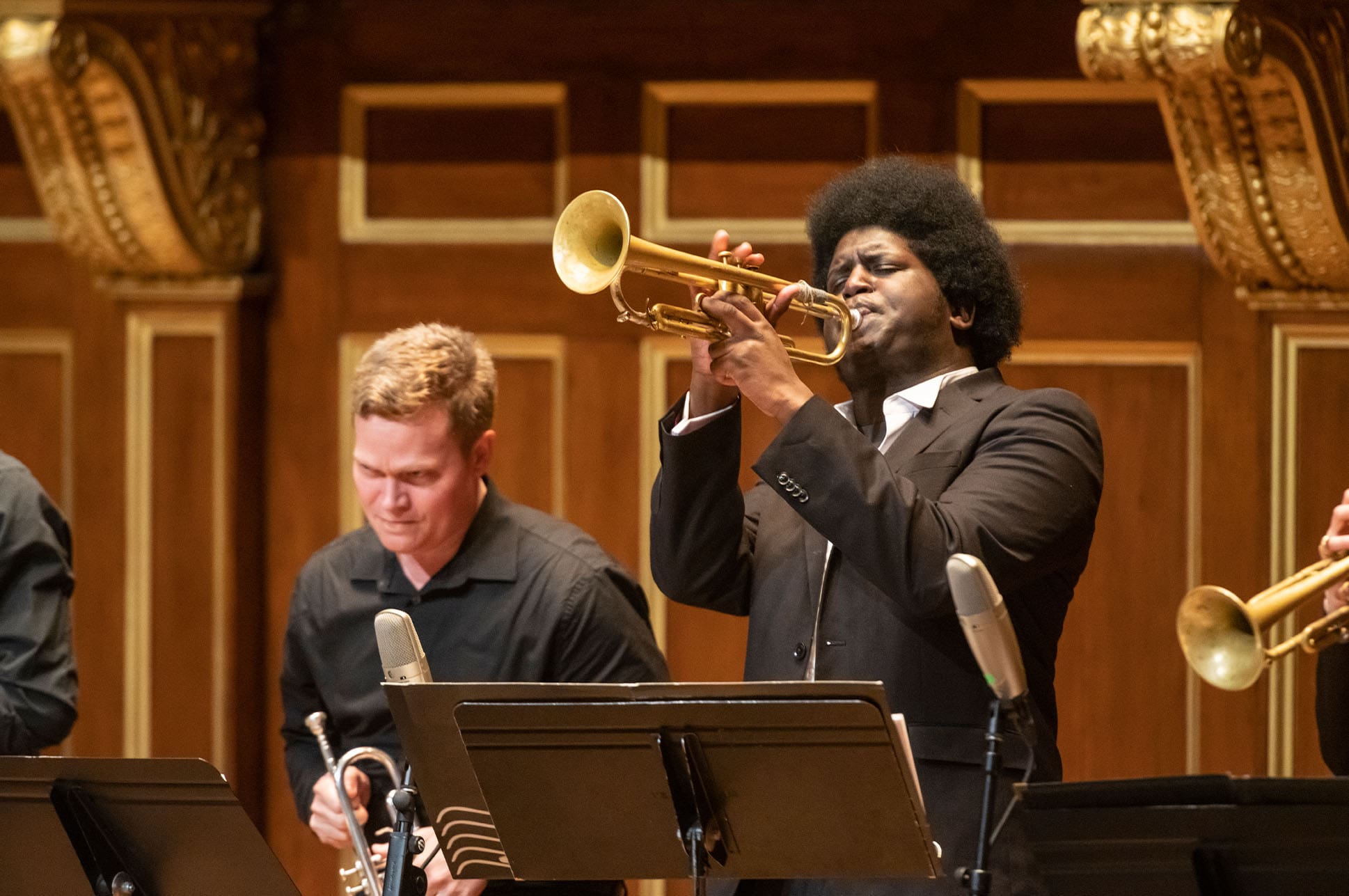Performance Opportunities: Jazz Ensembles

Faculty-coached small ensembles are a hallmark of NEC’s inclusive approach to music making, including ensembles focused on free jazz, early jazz, gospel music, Brazilian music, and songwriting, as well as more traditional approaches to jazz performance.
Small Ensembles are coached by faculty members Jerry Bergonzi, Frank Carlberg, Dominique Eade, Cecil McBee, Jason Moran, Joe Morris, Jason Palmer, Anna Webber and others, performing on campus at least twice a year. Although the focus of NEC’s ensemble program is on smaller groups, NEC also has two jazz orchestras, performing a range of repertoire, often with guest artists.

Jazz Ensembles

Jazz Ensembles
NEC Jazz Orchestra
The NEC Jazz Orchestra performs traditional and contemporary big band music under the direction of Ken Schaphorst as well as other faculty and guest artists. These have included such prominent musicians as Django Bates, Carl Bley, Bob Brookmeyer, Sam Rivers, Maria Schneider, Gunther Schuller, and Randy Weston. The band is open to all NEC students by audition.
Jazz Ensembles
NEC Jazz Composers’ Workshop Orchestra

The NEC Jazz Composers’ Workshop Orchestra is devoted to rehearsing and performing works by NEC Jazz Composition students. The ensemble is coached by Frank Carlberg and gives the composers the opportunity to learn how to rehearse and conduct a band, as well as have their works heard. The Jazz Composers Workshop Orchestra has also worked with guest composers, including Michael Formanek and Anna Webber.

Jazz Ensembles
Endless Opportunities
Explore the Ensembles
The ensemble’s repertoire varies from year to year, depending on the students’ interests. They perform a diverse amount of music, ranging from standards to Bergonzi arrangements and originals. Students are also encouraged to bring in their own music.
In this ensemble, students are encouraged to bring original compositions to be workshopped in rehearsals. The group will also play music from a wide variety of sources, including classic works and pieces by contemporary masters.
This ensemble aims to explore Brazilian music, from the early choros of the 19th century to the music of Tom Jobim, Hermeto Pascoal, and Guinga. Several styles will be approached, including frevo, samba, maracatu, and baião, along with the social-historical understanding of the contexts in which these styles were created.
The Jazz Composers Ensemble is a workshop-style ensemble where students are invited to write for each other. Attention to the group sound, improvisational concepts, the rehearsal process, and the feedback from the ensemble members is as important as the compositions and sketches themselves. Assignments focus on themes such as through-composed charts, one-page tunes, graphic scores, solo or duo pieces, and open-form compositions.
Dominique Eade emphasizes a group sound rather than a rhythm section playing for singers. The student vocalists select and arrange much of the repertoire and learn to lead the ensemble in rehearsal and performance. Vocal improvisation is emphasized as well. Rhythm section players have considerable opportunities to play improvised solos and learn the art of complementing a vocalist in a variety of styles.
This ensemble allows student singers and instrumentalists to explore using writing prompts, learning and analyzing existing repertoire, and workshopping their works-in-progress.
The NEC Gospel Ensemble explores contemporary gospel music as it is currently being created and performed. This ensemble works with repertoire composed within the last 20 years of contemporary gospel music and highlights key composers and choir leaders. Vocalists have opportunities to learn and work with traditional and more current forms of vocal harmony, call and response/hymn lining, and improvisation, as utilized in modern African-American churches. Instrumentalists have great opportunities to arrange as an independent entity and work with re-harmonization as well as work with the subtleties of a small vocal ensemble. All music is taught and learned through oral tradition, with a focus on the importance and role of music in African-American social and spiritual settings.
In this ensemble, students will learn to play traditional instruments for two popular rhythms from the Ewe people of Southern Ghana: Gahu (a funky groove in 2/4) and Agbekor (a warrior dance in 12/8). We will also create new arrangements using traditional songs adapted to the students’ primary instruments. The class incorporates Leake’s Harmonic Time method, which comprises stepping to the beat (ankle bells), bell patterns (sticks), and the voice to internalize musical time, groove, and mathematics. (Spring semester only. Required for undergrad and grad percussionists.)
This ensemble performs arrangements and compositions in a wide range of styles and genres. The main emphasis is on striving for a strong “group” sound. Students are encouraged to voice and suggest ideas and concepts about existing material and to bring in arrangements and compositions to achieve this goal further.
These ensembles play a variety of music, including originals and arrangements by students and ensemble leader Cecil McBee. McBee also stresses the importance of standard repertoire and traditional playing.
These ensembles focus on understanding the methodologies of the music known as “Free Jazz” and “Free Improvisation” using compositions and ideas by Ornette Coleman, Cecil Taylor, Anthony Braxton, Albert Ayler, Henry Threadgill, Julius Hemphill, Sun Ra, Steve Lacy, Eric Dolphy, Derek Bailey, Evan Parker, and others.
Bob Nieske’s ensembles focus on valuing your voice while supporting the group — playing responsibly by developing the ability to respond to different situations. Music ranges from fully arranged pieces to completely free: Raymond Scott, Mingus, Sun Ra, Ellington, originals, and more. Performers are encouraged to use the group as a writing workshop for original pieces or arrangements of favorites. Bob Nieske usually writes at least one arrangement a term for a vocalist if there is one in the group. Vocalists will also sing lines with horns.
This ensemble focuses on student compositions and interpretations of diverse material, emphasizing non-traditional forms and flexible approaches to ensemble playing, improvisation, and rhythm.
This ensemble will explore the recording studio as a platform for jazz composition and performance. To transform and expand our musical resources, we will experiment with studio techniques like overdubbing, editing, and mixing, both inside and outside rehearsal time. Previous experience with DAW technique is encouraged but not required.
This ensemble will explore two facets of modern jazz: the authentic use of world rhythms of South America and the Caribbean and the works of high-level jazz composers such as Ralph Towner, Lyle Mays, and Paquito D’Rivera, all of whom Walker has worked with and who have utilized these rhythms in groundbreaking compositions.
The Mark Zaleski ensemble will focus on developing the collaboration skills of its members through the study and performance of a combination of original repertoire and music from different eras of the jazz and contemporary music canon. The development of an original style and sound is the ensemble’s primary objective from a group and individual standpoint. The ensemble will have one recording per semester that will be required listening and will be analyzed in depth to determine the characteristics that contribute to their unique sound. In the past, these recordings have included Sam Rivers’ Fuchsia Swing Song, Horace Silver’s Horace-Scope, Hank Mobley’s Soul Station, Mark Turner’s Dharma Days, and Aaron Parks’ Invisible Cinema.
This ensemble will focus on rhythm, looking at it from a variety of perspectives: mixed meters, polyrhythms, irrational meters, etc. We will work on compositions from a variety of sources that include these elements. Students will also be encouraged to bring in their own compositions.
The ensemble will work on improvisational and compositional techniques. The repertoire consists of student compositions and compositions Moran has composed/performed.
This ensemble will focus primarily on workshopping originals from ensemble members and by Palmer. The first half of the semester will focus on workshopping as many works as possible from the ensemble/Palmer and works by artists currently active on the scene (i.e., Kurt Rosenwinkel, Mark Turner, Nicholas Payton, etc.). The second half of the semester will focus on curating a set of music selected from the list of songs workshopped in the first half for a culminating recital. We focus on aspects of creative music making, including but not limited to swinging/grooving, free interpretation, odd-time signatures/mixed meter, duo/trio/full ensemble development within a composition, and metric modulation.
This ensemble explores the period from 1923-1935, beginning with the Oliver Creole Jazz Band and ending with the first recordings of Count Basie with Lester Young. We will define this in relation to iconic recordings, including King Oliver’s Creole Jazz Band, Jelly Roll Morton’s Red Hot Peppers, Early Ellington, etc., and to iconic players like Louis Armstrong, Bix Beiderbecke, Sidney Bechet, Johnny Dodds, Johnny St. Cyr, Pops Foster, Zutty Singleton, Baby Dodds, etc. We will listen to recordings and “transcribe” solos (by ear, of course). We will learn to hear the nuances of the rhythm section despite the limitations of early recordings, and we will analyze elements of pitch, scale, timbre, rhythm, and phrase, then put our work into practice. Brass players, invest in lots of mutes!

